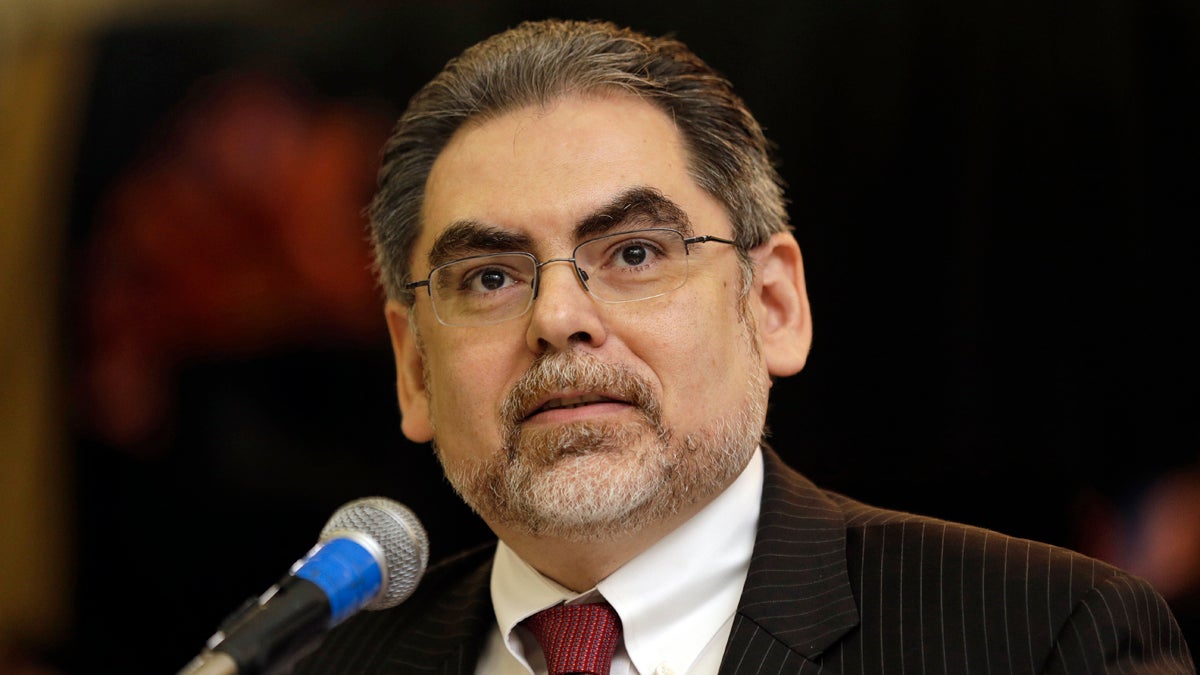Possibility of vesting Philly SRC with taxing power raised in Harrisburg

Pedro A. Ramos, chairman of the School Reform Commission, speaks during a news conference at Andrew Jackson Elementary School in Philadelphia. (AP file Photo/Matt Rourke)
Could the state-controlled Philadelphia School Reform Commission soon decide how much city residents pay in sales taxes?
Gov. Tom Corbett’s budget secretary, Charles Zogby, said there has been talk in Harrisburg of changing the law to give the SRC that power if City Council does not quickly extend a 1-percent local sales tax that was due to expire.
The tax extension, a key part of Corbett’s funding package for Philadelphia’s cash-strapped school district, would raise up to $120 million for the schools in future years and allow the city to borrow $50 million for them now. The General Assembly authorized the sales tax changes this summer.
“There’s just so much patience that I think folks are going to be prepared to exercise,” said Zogby. “If City Council is unwilling to act, I think there’ll be those in Harrisburg who will say, ‘Well, then maybe we need to look at another path and take City Council out of the picture.'”
Council members have balked at Corbett’s funding plan, which they see as desperately short on state dollars. They want to instead evenly split the local sales tax money between the schools and the city’s troubled pension fund, and make up the difference with more state funding and a new cigarette tax.
Mayor Michael Nutter supports those changes as a whole package, but he wants Council to pass the sales-tax extension now so the city can immediately borrow money for the schools. To raise extra funds for this year, Council prefers giving the district $50 million in exchange for several properties.
Zogby would not say who, exactly, is talking about giving the SRC power over the city’s sales tax, or whether Corbett would endorse it. He said only that the idea has been “raised in some quarters.”
Most school boards in other parts of Pennsylvania have the authority to levy taxes and are elected, not appointed, like the SRC.
Spokesman Erik Arneson said state Senate Majority Leader Dominic Pileggi, R-Delaware, had not heard of any such talks to change the current setup in Philadelphia.
Still, the mere possibility drew the ire of some elected officials.
“The idea of giving these folks taxing power when they have not been elected? Oh, absolutely not. Absolutely not,” said state Sen. Vincent Hughes, D-Philadelphia. “What we need to be talking about is … the School District of Philadelphia is in the crisis that it’s in right now because the governor has cut funding.”
Legality of taxing move disputed
Hughes claimed that “it is against the state law, the fiscal code [and] the city charter” to give the SRC that power. Zogby insists that it is legally possible, though it would clearly require action by the General Assembly.
Bill Patton, a spokesman for House Minority Leader Frank Dermody, D-Allegheny, said the idea “seems to make little sense … the most immediate problem the school district has right now is cash flow.”
In a letter delivered to Corbett Thursday, Dermody and House Democratic Whip Mike Hanna, D-Centre, urged him to shake loose an extra $45 million that has been set aside for the city’s schools pending “reforms.”
Zogby said the Corbett administration will not release that funding until the teachers union makes major financial and work-rule concessions, which it sees as essential to the district’s viability. The district is seeking more than $100 million in givebacks from the teachers.
Council President Darrell Clarke’s spokeswoman, Jane Roh, did not directly respond to questions about whether he would support giving the SRC taxing power. She said Council will continue to fight for a new state formula that distributes money to the city’s schools in a way that is “sustainable and reliable” as well as “fair to Philadelphia taxpayers.”
Zogby would not say how long Council has before this theoretical plan could become real.
If Council or another body approves a sales tax extension, thus paving the way for the city to borrow $50 million against the future revenue, that would not enable the district this year to hire back any of its 3,000 employees that have been lost due to both budget-balancing layoffs and attrition. The district has already booked the $50 million, after receiving promises from both Council and Nutter that it will ultimately materialize.
WHYY is your source for fact-based, in-depth journalism and information. As a nonprofit organization, we rely on financial support from readers like you. Please give today.

